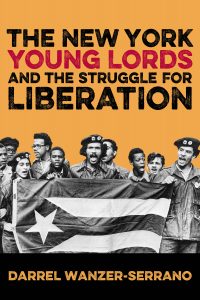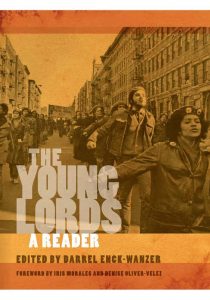Darrel Wanzer-Serrano

- Areas of Speciality
-
- Humanities & Critical/Cultural Studies
- Media, Culture, and Identity
- Rhetoric and Public Affairs
- Contact
-
- dws@tamu.edu
- Professional Links
- Personal Website
- Specialty
- Rhetoric & Public Affairs
Introduction
Darrel Wanzer-Serrano (PhD, Indiana University, 2007) is Director of the Race & Ethnic Studies Institute and Associate Professor in the Department of Communication & Journalism. He is also Core Faculty in the Latino/a and Mexican American Studies (LMAS) Program. He teaches graduate and undergraduate courses in rhetoric, race/racism, and Latina/o/x studies. His award-winning book, The New York Young Lords and the Struggle for Liberation, crafts a critical rhetorical history of the Latinx social movement organization and treats them as a touchstone for building decolonial theory and praxis.
Bio
Dr. Darrel Wanzer-Serrano is Director of the Race and Ethnic Studies Institute and Associate Professor in the Department of Communication and Journalism at Texas A&M University. He is also Core Faculty in the Latino/a and Mexican American Studies (LMAS) Program. His research is focused on the intersections of race, ethnicity, and public discourse, particularly as they relate shifting cultural and organizational terrains. His last book, The New York Young Lords and the Struggle for Liberation (Temple University Press, 2015), is the first scholarly monograph on one of the most significant organizations of the Puerto Rican diaspora. The Young Lords (1969-1976) was a revolutionary nationalist, anti-racist, anti-sexist street political organization who advanced a thirteen-point political program featuring support for the liberation of all Puerto Ricans (on the island and in the U.S.), the broader liberation of all “Third World people,” equality for women, US demilitarization, leftist political education, socialist redistribution, community control, and other programs as they fit into their platform and ecumenical ideology. As part of the broader Young Lords project, he edited The Young Lords: A Reader (New York University Press, 2010), which was a well reviewed critical edition of primary source documents produced originally by the organization. His scholarship has also appeared in numerous journals, edited books, and in various public forums. Currently, Dr. Wanzer-Serrano is conducting critical interpretive research related to the discourse of emerging Hispanic-Serving Institutions as co-PI of the EVOLVE HSIs study. He is also starting work as PI of RESI’s Anti-DEI Legislation Impact Study (ADLIS), examining the effect of recent legislative debates on faculty at HSIs across the country. Most recently, he edited a forum in the Quarterly Journal of Speech, for which he penned the introduction that argues rhetorical studies is fundamentally racist and needs some substantive antiracist attention. “Rhetoric’s Rac(e/ist) Problems” is among top 3 most viewed/downloaded articles in the history of the journal. Dr. Wanzer-Serrano teaches graduate and undergraduate courses in rhetoric, critical race studies, Latinx studies, social movement, and more.
Courses Taught
- COMM 203: Public Speaking
- COMM 301: Rhetoric of Western Thought
- COMM 431: Rhetoric of Social Movements
- COMM 653, Rhetoric & Public Culture || Topic: Race/Racism & Public Culture
- COMM 658, Seminar in Communication & Culture || Topic: Decolonaility
Representative Publications
- Wanzer-Serrano, D. (2019). “Rhetoric’s Rac(e/ist) Problem.” Quarterly Journal of Speech 105.4: 465-76.
- Baugh, S. and D. Wanzer-Serrano (2018). “Against Canon: Engaging the Imperative for Race in Rhetoric.” Communication and Critical/Cultural Studies 15.4: 337-42.
- Wanzer-Serrano, D. (2018). “Decolonial Rhetoric and a Future Yet-to-Become: A Loving Response.” Advances in the History of Rhetoric 21.3: 326-30.
- Wanzer-Serrano, D. (2012). “Decolonizing Imaginaries: Rethinking ‘the People’ in the Young Lords’ Church Offensive.” Quarterly Journal of Speech 98.1: 1-23.
- Wanzer-Serrano, D. (2012). “Delinking Rhetoric, Or Revisiting McGee’s Fragmentation Thesis Through Decoloniality.” Rhetoric & Public Affairs 15.4: 647-57.
- Wanzer-Serrano, D. (2011). “Tropicalizing East Harlem: Rhetorical Agency, Cultural Citizenship, and Puerto Rican Cultural Production.” Communication Theory 21.4: 344-67.
- Wanzer-Serrano, D. (2011). “Race, Coloniality, and Geo-Body Politics: The Garden as Latin@ Vernacular Discourse.” Environmental Communication: A Journal of Nature and Culture 5.3: 363-71.
Books
 Wanzer-Serrano, Darrel. The New York Young Lords and the Struggle for Liberation. Philadelphia: Temple University Press, 2015.
Wanzer-Serrano, Darrel. The New York Young Lords and the Struggle for Liberation. Philadelphia: Temple University Press, 2015.
In The New York Young Lords and the Struggle for Liberation, Darrel Wanzer-Serrano details the numerous community initiatives that advanced decolonial sensibilities in El Barrio and beyond. Using archival research and interviews, he crafts an engaging account of the Young Lords’ discourse and activism. He rescues the organization from historical obscurity and makes an argument for its continued relevance, enriching and informing contemporary discussions about Latino/a politics.
“Professor Wanzer-Serrano has made a significant contribution to scholarship through his book. His sophisticated discussions of theory and praxis, his bold move to challenge contemporary conceptions of coloniality, and his detailed case study … render this not only a book worth reading, but also one that becomes part of the canon of rhetorical studies, a hallmark of the best work rhetoric has to offer…. In short, I would say that it is now not possible to talk about race, otherness, marginality, or power seriously in rhetorical studies without having to confront Wanzer-Serrano’s suggested optic of decoloniality.” (Kent Ono, Advances in the History of Rhetoric 21.3 [2018])
 Wanzer-Serrano, Darrel. The Young Lords: A Reader. New York: New York University Press, 2010.
Wanzer-Serrano, Darrel. The Young Lords: A Reader. New York: New York University Press, 2010.
The Young Lords offers readers the opportunity to learn about this vibrant organization through their own words and images, collecting an array of their essays, journalism, photographs, speeches, and pamphlets. Organized topically and thematically, this volume highlights the Young Lords’ diverse and inventive activism around issues such as education, health care, gentrification, police injustice and gender equality, as well as self-determination for Puerto Rico. In recovering these rare written and visual materials, Darrel Wanzer-Serrano has given voice to the lost chorus of the Young Lords, while providing an indispensable resource for students, scholars, activists, and others interested in learning about this influential grassroots “street political” organization.
